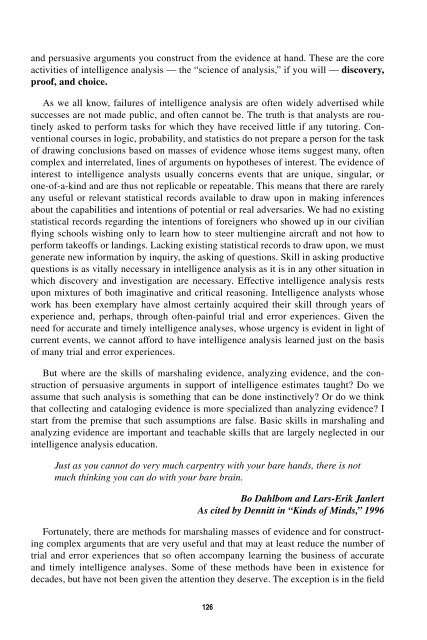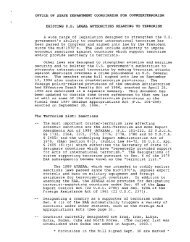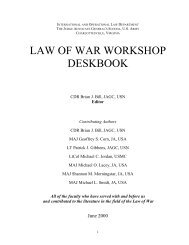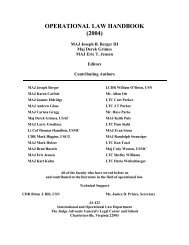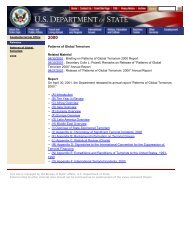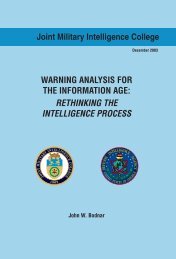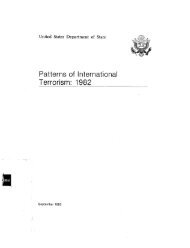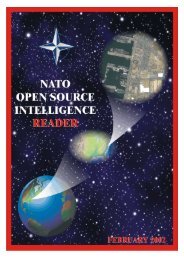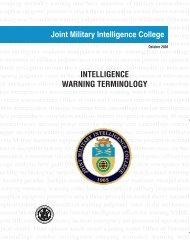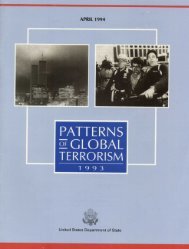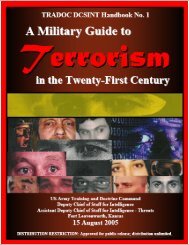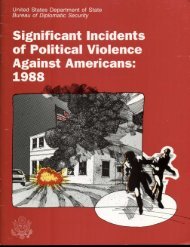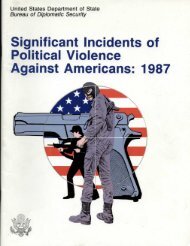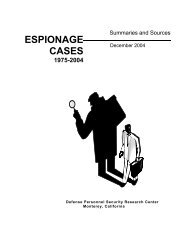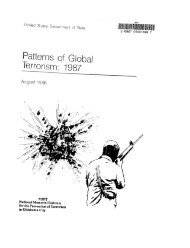learning with professionals - Higgins Counterterrorism Research ...
learning with professionals - Higgins Counterterrorism Research ...
learning with professionals - Higgins Counterterrorism Research ...
You also want an ePaper? Increase the reach of your titles
YUMPU automatically turns print PDFs into web optimized ePapers that Google loves.
and persuasive arguments you construct from the evidence at hand. These are the core<br />
activities of intelligence analysis — the “science of analysis,” if you will — discovery,<br />
proof, and choice.<br />
As we all know, failures of intelligence analysis are often widely advertised while<br />
successes are not made public, and often cannot be. The truth is that analysts are routinely<br />
asked to perform tasks for which they have received little if any tutoring. Conventional<br />
courses in logic, probability, and statistics do not prepare a person for the task<br />
of drawing conclusions based on masses of evidence whose items suggest many, often<br />
complex and interrelated, lines of arguments on hypotheses of interest. The evidence of<br />
interest to intelligence analysts usually concerns events that are unique, singular, or<br />
one-of-a-kind and are thus not replicable or repeatable. This means that there are rarely<br />
any useful or relevant statistical records available to draw upon in making inferences<br />
about the capabilities and intentions of potential or real adversaries. We had no existing<br />
statistical records regarding the intentions of foreigners who showed up in our civilian<br />
flying schools wishing only to learn how to steer multiengine aircraft and not how to<br />
perform takeoffs or landings. Lacking existing statistical records to draw upon, we must<br />
generate new information by inquiry, the asking of questions. Skill in asking productive<br />
questions is as vitally necessary in intelligence analysis as it is in any other situation in<br />
which discovery and investigation are necessary. Effective intelligence analysis rests<br />
upon mixtures of both imaginative and critical reasoning. Intelligence analysts whose<br />
work has been exemplary have almost certainly acquired their skill through years of<br />
experience and, perhaps, through often-painful trial and error experiences. Given the<br />
need for accurate and timely intelligence analyses, whose urgency is evident in light of<br />
current events, we cannot afford to have intelligence analysis learned just on the basis<br />
of many trial and error experiences.<br />
But where are the skills of marshaling evidence, analyzing evidence, and the construction<br />
of persuasive arguments in support of intelligence estimates taught? Do we<br />
assume that such analysis is something that can be done instinctively? Or do we think<br />
that collecting and cataloging evidence is more specialized than analyzing evidence? I<br />
start from the premise that such assumptions are false. Basic skills in marshaling and<br />
analyzing evidence are important and teachable skills that are largely neglected in our<br />
intelligence analysis education.<br />
Just as you cannot do very much carpentry <strong>with</strong> your bare hands, there is not<br />
much thinking you can do <strong>with</strong> your bare brain.<br />
Bo Dahlbom and Lars-Erik Janlert<br />
As cited by Dennitt in “Kinds of Minds,” 1996<br />
Fortunately, there are methods for marshaling masses of evidence and for constructing<br />
complex arguments that are very useful and that may at least reduce the number of<br />
trial and error experiences that so often accompany <strong>learning</strong> the business of accurate<br />
and timely intelligence analyses. Some of these methods have been in existence for<br />
decades, but have not been given the attention they deserve. The exception is in the field<br />
126


